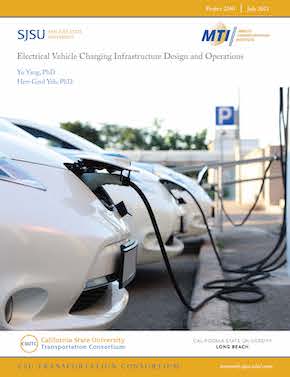- 408-924-7560
- mineta-institute@sjsu.edu
- Donate
Electrical Vehicle Charging Infrastructure Design and Operations
California aims to achieve five million zero-emission vehicles (ZEVs) on the road by 2030 and 250,000 electrical vehicle (EV) charging stations by 2025. To reduce barriers in this process, the research team developed a simulation-based system for EV charging infrastructure design and operations. The increasing power demand due to the growing EV market requires advanced charging infrastructures and operating strategies. This study will deliver two modules in charging station design and operations, including a vehicle charging schedule and an infrastructure planning module for the solar-powered charging station. The objectives are to increase customers’ satisfaction, reduce the power grid burden, and maximize the profitability of charging stations using state-of-the-art global optimization techniques, machine-learning-based solar power prediction, and model predictive control (MPC). The proposed research has broad societal impacts and significant intellectual merits. First, it meets the demand for green transportation by increasing the number of EV users and reducing the transportation sector’s impacts on climate change. Second, an optimal scheduling tool enables fast charging of EVs and thus improves the mobility of passengers. Third, the designed planning tools enable an optimal design of charging stations equipped with a solar panel and battery energy storage system (BESS) to benefit nationwide transportation system development.
YU YANG, PHD
Dr. Yu Yang received his BSc degree from Beijing Institute of Technology, Beijing, China, in 2004; his MSc degree from Zhejiang University, Hangzhou, China, in 2007; and his Ph.D. from the Department of Chemical Engineering, University of Alberta, Edmonton, Canada, in 2011. He then became a postdoctoral associate at the Massachusetts Institute of Technology. He currently is an assistant professor in the Department of Chemical Engineering, at California State University, Long Beach. His research interests include data-driven modeling, advanced process control, machine learning, global optimization under uncertainty, and the analysis and design of renewable energy systems.
HEN-GEUL YEH, PHD
Dr. Hen-Geul Yeh received his BSc degree in engineering science from National Chen Kung University, Taiwan, ROC, in 1978, and his MSc degree in mechanical engineering and his Ph.D. in electrical engineering from the University of California, Irvine, in 1979 and 1982, respectively. Since 1983, he has been with the Electrical Engineering Department at CSULB and has served as the Department Chair since 2016. In addition to his technical and engineering excellence, he was selected as a NASA JPL Summer Faculty Fellow twice, in 1992 and 2003, and the Boeing Welliver Faculty Fellow in 2006. His research interests include DSP/Communication/Control algorithms development using MATLAB, and their implementation using FPGA and digital signal processors with applications in communication systems, smart grids, optimization, controls, and electrical event detection, with a focus on real-time digital signal processing, Wi-Fi and Wi-MAX, adaptive systems, and mobile communication in multipath fading channels. He has published over 100 research papers on signal processing, communications, controls, and smart grids.
-
Contact Us
San José State University One Washington Square, San Jose, CA 95192 Phone: 408-924-7560 Email: mineta-institute@sjsu.edu






